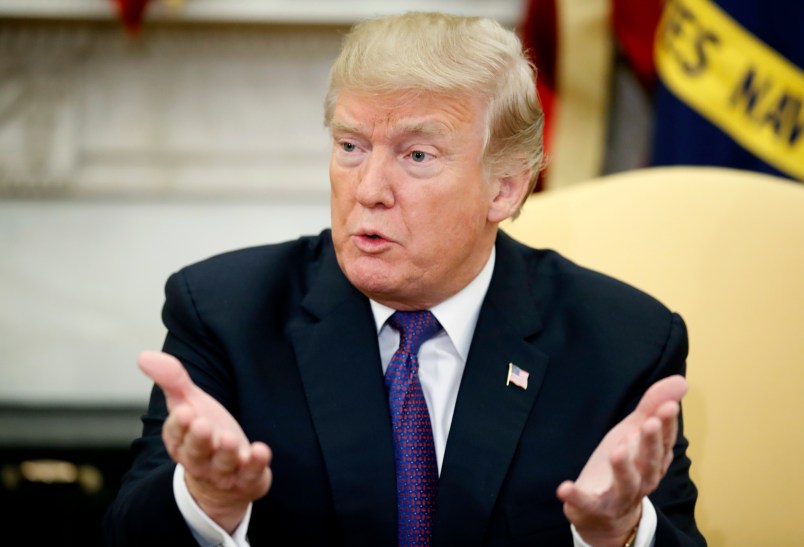With government funding set to expire on Friday, the House of Representatives voted late Thursday afternoon to pass a two-week “continuing resolution” to keep the lights on until December 22. Nearly every single Democrat voted against the bill and nearly every Republican voted for it.
About an hour later, the Senate followed suit.
The short-term deal leaves a host of issues unresolved, including funding for the entire federal government for next year, the status of roughly 800,000 undocumented immigrants who came to the U.S. as children, and the long-term fate of the Children’s Health Insurance Program (CHIP), which expired in October.
The far-right flank of Republicans in the House had threatened earlier this week to vote against the stopgap funding bill, voicing fear they would lose leverage in shaping the long-term spending bill—which must be hammered out just before Christmas.
“We’re trying to make sure we don’t get a terrible spending bill with high numbers so the headlines don’t read: ‘Largest spending Congress in history under a Republican administration,” Rep. Mark Meadows (R-NC), the leader of the Freedom Caucus, explained to reporters before the vote. “There are a number of people who have real concerns about voting for a short-term CR if we’re not getting anything really different from what we got in the last six years.”
At the same time, Meadows acknowledged, many of his GOP colleagues felt that it’s worth it to let go of some of their demands for slashing government funding in order to focus on getting their massive tax overhaul—including deep cuts to corporate taxes—over the finish line.
“There’s a voice within our caucus saying tax reform must be our highest priority,” he said. “Some are willing to give leadership a little more flexibility in exchange for a quicker timetable on tax reform.”
Earlier this week, in anticipation that even the short-term deal could fall through, President Trump took to social media to preemptively blame a government shutdown on Democrats.
But many rank-and-file Republicans readily admitted leading up to the vote that their party, which currently controls every branch of government, would be the one to shoulder the responsibility.
“Nobody wants a government shutdown, and I don’t care what they say, there’s no way we can blame the Democrats,” Rep. Peter King (R-NY) told TPM. “We control the House, the Senate, the White House, governorships, everything. If we can’t keep the government open, it’s our fault.”
King also pointed to the importance of the tax bill negotiations in rallying Republicans to back a spending bill that may not have been exactly to their liking.
“The tax bill is supposed to be the crowning achievement for Republicans,” he said. “This is it for the whole year. This is the top of the mountain. But here we are arguing about a shutdown. Talk about stepping on your own story!”







If I were minority leader in the Senate, I’d pull the trigger. Shut the government down for weeks. Months. However long it takes to destroy this tax bill. I hope Schumer is getting something good in return for letting up on the pressure he could bring to bear, if he chose.
CHIP, DACA, CHIP, DACA, CHIP, DACA
Fix both or don’t ask for any Democratic votes and deal with the Freedom Caucus loons yourselves.
If only the Republicans had a majority in both Houses and a Preisdent in the White House, they could have resolved this months ago.
How is it that people who are deathly afraid of uncertainty in taxation, and perfectly fine with the uncertainty associated with CRs? Remember when the Congress would debate and vote on a budget sent over from the Executive Branch?
The same people who are now complaining about having to work on a CR just before Christmas are the same people that refused to debate Obama budgets. They gave us Sequester and CRs. BTW, if they were really concerned about spending, they should have convinced their leadership and POTUS to work on a budget. These guys are still refusing to govern, even with a Republican POTUS. This is criminal- they are collecting salaries, benefits and perks for doing NOTHING.
Peter King of New York state that will be hit particularly hard by the repeals of SALT is using that onerous bill as a reason to celebrate? How safe is his district? Methinks not as safe as it was before the House passed it’s version of the tax bill and before Ryan started in on cutting Medicare and Medicaid to pay for it.